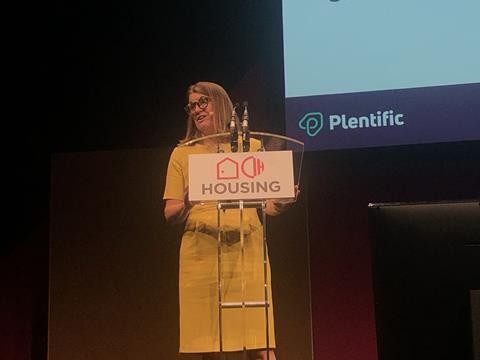With new social housing regulations and a gloomy economic outlook, attendees at the Chartered Institute of HousingтАЩs annual conference were not short of things to talk about. Daniel Gayne and Carl Brown report on the hot topics in Manchester this week

Thousands of housing professionals packed into the Manchester Central Convention Complex this week for the Chartered Institute of HousingтАЩs (CIH) annual conference.
Last yearтАЩs event was the first тАШproperтАЩ conference for three years due to covid, but it was back to business-as-usual this year, with housebuilders and social housing providers facing a difficult economic environment and a tougher regulatory backdrop.
This yearтАЩs show was also the last time the event, branded Housing, will serve as the CIHтАЩs annual conference. Next year Housing will be run solely as an event produced by events company Ocean Media Group, while the CIH will put on its own annual conference separately, possibly in a different city. The CIH has to date released no details of where or when its next annual conference will be.
Here we break down the key talking points from in and around the conference.
Conference gives support to CIH president after online abuse
The start of this yearтАЩs conference was overshadowed by a torrent of abuse directed at Lara Oyedele on social media.
On the eve of the event the Chartered Institute of Housing (CIH) president gave an interview to ║┌╢┤╔ч╟Ї in which she described her work to improve diversity on boards and executive teams. She suggested ministers pass regulations to enforce quotas for black and minority ethnic people and women on boards.
║┌╢┤╔ч╟ЇтАЩs tweets of the article appeared to have been shared by some extremists on Twitter leading to dozens of abusive comments directed at Oyedele.
The sector rallied around Oyedele. Gavin Smart, chief executive at CIH, in his opening keynote said: тАЬI want to be clear to you today that we stand squarely behind Lara as our president and what she said about our need to improve as a sector and her campaign to encourage greater diversity and professionalism,тАЭ he told the conference, which responded with a round of applause.
тАЬWe will never accept the level of abuse that she was subject to, and I hope you and your colleagues will express support for thatтАЭ.
Kate Henderson, chief executive of the National Housing Federation, was also quick to support Oyedele with a supportive thread on Twitter.
She said: тАЬIтАЩm so sorry to see the misogyny and racist abuse in some of the commentsтАж Thank you Lara Oyedele, for your leadership on diversity, itтАЩs clearly needed now more than ever.тАЭ
Oyedele herself alluded to the abuse in her remarks bringing the conference to a close, saying that she was nonetheless тАЬgratefulтАЭ for the existence of social media, without which, she said, she would never have become president of the CIH.
тАЬOnline racism is something I have experienced for a long while and usually I just block them,тАЭ she said. тАЬBut on Monday there was just so much I could not keep up with itтАЭ.
Government and industry outline response to Awaab Ishak death
The death of two-year-old Awaab Ishak was another dark cloud over this yearтАЩs conference. The Social Housing (Regulations) Bill introduced in the wake of the toddlerтАЩs death from exposure to mould was passed while the conference was in progress and, on the first day of the event, Greater Manchester mayor Andy Burnham addressed the elephant in the room.
тАЭThis conference has to be different from gatherings in previous years,тАЭ he said. тАЭIn this day and age, in a country as wealth as ours, a two-year-old boy was killed by his home. ItтАЩs an entirely man-made problem and an indictment of national housing policy under successive governmentsтАЭ.

Burnham used the conference to announce , outlining a new carrot-and-stick approach to improving conditions using new powers handed to him under the recent devolution deal.
A new Good Landlord Charter for Greater Manchester, which will recognise good behaviour, will be underpinned by a property check system under which tenants can request independent inspection of their homes by an official from the Greater Manchester Combined Authority. If landlords fail to comply with recommended improvement, Burnham threatened that the authority could take properties off them.
The Social Housing (Regulations) BillтАЩs was another major talking point across the conference. Smart welcomed the move in his opening speech, saying there was тАЬmore to celebrate than to worry aboutтАЭ.
In a panel session on the topic, Sue Shirt, chief customer officer at social housing provider Stonewater, said that if professionalisation gave housing managers a bigger voice then it would be тАЬreally positiveтАЭ.
Nick Murphy, board member at Trident housing association, emphasised the importance that the sector focus on тАЬtraining people rather than chasing peopleтАЭ with the necessary qualifications, to avoid spiralling labour costs.
Questions over decarbonisation funding amid tough economic circumstances
Many of the conversations around the conference centre, and in nearby bars and restaurants, in Manchester this year focused on all the different cost pressures affecting housing associations.
Not least of these is decarbonisation. The cost of which Savills has previously estimated will run to ┬г36bn based on bringing all stock up to energy performance c with an air-source heat pump fitted, by 2050.
A session on Tuesday afternoon titled тАЬHow do we fund decarbonisation costs?тАЭ in the net zero area of the exhibition hall drew a sizeable audience.
Miles Lewis, director of sustainability at Clarion, talked about different sources of funding and opportunity for innovation. However, he warned тАЬthat the mechanisms and the vehicles to be able to deliver returns for investors [in retrofit] are often not set up in the right wayтАЭ currently.
Louise Leaver, partner and joint head of housing at law firm Bevan Brittan, talked about how to embed decarbonisation funding in governance and asked the key question тАЬWhere does it fit into your hierarchy of pressures?тАЭ

The panel also touched on engagement with residents, the readiness of the supply chain and the impact on funding of policy uncertainty, although the panellists seem to agree the issue is ripe for innovation
A stark warning, however, was given by the funder in the room.
Chris Yau, director of origination and sustainability at Lloyds Banking Group, warned about the importance of evaluating and demonstrating ESG to attract finance for decarbonisation.
тАЬYour ESG performance is being baked into lending decisions. We will move from carrot to stick,тАЭ he warned.
Industry is modernising despite high-profile MMC failures
Modern methods of construction were always bound to be a major topic at the conference, but recent factory closures at and changed the colour of those conversations.
There was quite substantial frustration among some in the space at the conflation of different kinds of MMC, with some companies feeling they were unfairly being tarred with the same brush.
Mark Farmer, chief executive at Cast Consultancy and the governmentтАЩs MMC champion, gave voice to these concerns in a third-day afternoon session, describing headlines about doomed offsite firms as тАЬslightly overdoneтАЭ.
тАЬThere was a focus, for whatever reason, on volumetric modular housing in isolation,тАЭ he said. тАЬClearly itтАЩs the highest impact, most high-profile type [тАж] so, when something goes wrong, the press is all over it wanting to understand whyтАЭ.
He said recent failures were essentially market driven, with recent economic headwinds having a bigger effect on companies with fixed costs.
тАЬThe traditional housebuilding model is being fleet of foot, stopping, starting, subcontracting everything to death so you are not holding any cost,тАЭ he said. тАЬIf you are trying to industrialise and to do things in a factory then you are actually holding the costs and you are probably employing people as well.тАЭ
On a more positive note, he said that despite the high-profile failures, the industry was modernising тАЬunder the radarтАЭ.
тАЬI have seen more change in the volume housebuilding market in the last six-to-eight months than I have since I wrote my report for the government in 2016,тАЭ he added.
Demands for increased social housebuilding as election approaches
You can tell there is an election in the air when it is standing room only at the early morning crystal ball gazing session on the final morning of conference.
Fiona Fletcher-Smith, L&Q chief executive and new chair of the G15, made a tongue-in-cheek allusion to Boris JohnsonтАЩs Brexit campaigning strategy as she set out her key demand for the next government тАУ build more social housing.
She referenced ║┌╢┤╔ч╟Ї Research EstablishmentтАЩs claim that poor housing cost the public sector ┬г14.2bn a year, saying тАЬI think that we should shove that on the side of a bus, drive around and see if we can convince people that building social rented housing is a good ideaтАЭ.
She made note of the ┬г60bn that the National Audit Office forecasts will be spent on housing benefit in the next five years and suggested that if the government was able to support the construction of 90,000 new social homes each year for the next decade it could тАЬcrack into this problemтАЭ and save the Treasury ┬г1.9bn annually on housing benefit alone.
Labour sets out its stall amid uncertainty around shadow housing brief
Evidently, the Labour Party is also beginning to turn its sights to next yearтАЩs election. Lisa Nandy, shadow secretary of state for levelling up, housing and communities has been teasing her partyтАЩs housing agenda for months now but gave conference perhaps the most cohesive picture of her vision for the brief yet.
Nandy said she would end WhitehallтАЩs тАЬcowardiceтАЭ over development, vowing to boost social and council development under a тАЬrefreshed modelтАЭ for housebuilding.
A Labour government, she said, would achieve this by removing the тАЬtaboo around the greenbeltтАЭ, reform planning policy, make compulsory purchase orders easier and reintroduce local housing targets.
Whether Nandy will stick around in the position long enough to see these policies realised is another question.
There was an audible groan from the audience in the aforementioned election 2024 panel when reports of her imminent reshuffle away from the housing brief тАУ reported in The Times yesterday тАУ were raised.
In an industry that has grown weary of the revolving door of Conservative housing ministers, suggestions of a lack of consistency on the opposition benches was not well received.
Housing minister insists government is still committed to 300,000 homes a year target

The conference wrapped up with an address from the current housing minister Rachel MacLean, who re-iterated the governmentтАЩs commitment to meet its manifesto target for housebuilding.
тАЭWe remain committed, no matter what anyone might have told you, to our ambition of delivering 300,000 homes per year,тАЭ she said. тАЬWe all know however that targets on their own will not deliver homes. It is essential that local authorities have up to date local plans in place to plan for housing that meets the needs of their communitiesтАЭ
She said the governmentтАЩs Levelling Up and Regeneration Bill would help тАЬmodernise our slow, complex, bureaucratic planning systemтАЭ and help ensure that planning тАЬworks with rather than against local communities.
She thanked the industry for its input on recent planning consultations and said the government was тАЭlistening very carefully to the input of everybody and thinking about how we got forward with our National Planning Policy FrameworkтАЭ.



























No comments yet